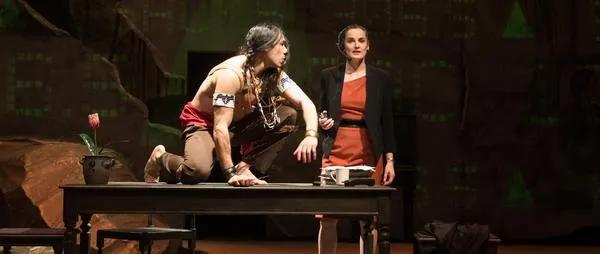
My husband, Ken, and I had positioned ourselves outside the box office of the renowned Oregon Shakespeare Festival in Ashland, Oregon, for the better part of two days now, armed with a little handmade sign, hoping to get two tickets to the final, sold-out performance of the world premiere production of “Manahatta.”
Written by playwright Mary Kathryn Nagle, “Manahatta” tells a raw, compelling and historically illuminating tale of the Native Americans (the Lenape tribe), who originally inhabited what we now know as Manhattan. It had garnered rave reviews, but more than that, something inside me told me I must see this play. I’ve learned to listen to that voice.
Hence, the box office folks and I were now on a first name basis, due to my popping in regularly, in hopes a patron may have just called to turn in a ticket or two.
The final matinee performance of the season was due to start at 1:30 p.m.
At 1 p.m., Ken and I continued to sit on the low stone wall just outside the box office, on this sunny Saturday, chatting with other theatre-goers. And hoping.
At 1:07, I went inside to check the box office yet again. No go.
By this time, Ken had developed a friendly rapport with Roger, obviously a kindred spirit, who’d recently come and sat on the other side of him on the Transaction Wall, hoping someone would show up with an extra ticket to today’s matinee performance in the other theatre space.
At 1:19, Shepherd (the box office attendant who held the record for the most times he’d checked the computer for me) came dashing out of the building, saying, “Nancy! Someone just turned in one ticket for Manahatta!”
Several of us shrieked with joy. I leapt to my feet, followed him in, and quickly handed over my Visa card.
While I was inside, Ken’s new friend, Roger, was offered two tickets — free ones! — to the other matinee showing. So he and Ken happily scurried off to the building across the street, and I made my way to my hard-earned seat inside the intimate “Manahatta” theatre, just steps away.
Now. Fast-forward approximately an hour and a half.
“Manahatta” is over. There’s been no intermission. Most audience members, like myself, exit in silence, having been profoundly moved by the experience we all shared. I walk quickly, find a sparsely-used side exit door, and beeline it across the street and downstairs in another building to a two-seater Ladies Room that I suspect will not yet have been hit by the throngs. (I was right.) Another woman, probably in her early seventies, had the same idea. She was several steps ahead of me on the same beeline route and is already in the other stall when I arrive.
We do our business, emerging simultaneously. Standing in front of the sinks as we wash our hands, we catch each other’s reflection in the mirror. We turn to face each other, and pause. Some skewed sense of social etiquette prevails, so I open my mouth and, as if from miles away, the highly inadequate words, “Wow — that was powerful!” come out.
We maintain eye contact for a few seconds, both welling up with tears. Then she opens her arms wide, in invitation. I step into them, and we stand there sobbing –deep, gut-level sobbing — in each other’s arms, for a good minute or so. (Which, believe me, is a long time to be sobbing in a stranger’s embrace in a public bathroom!)
We dry our eyes and our hands, ignoring others who’d now crowded into the tiny space, and silently walk, side by side, up the stairs and out into the warming sunlight, to her awaiting husband. (Mine is still in the other matinee.) We talk, sparsely, for a few moments.
“I’m involved in reparation work in Canada, where we live,” she tells me. Then, tearfully, “We have to forgive ourselves. Make reparations in any ways we can, learn, and move on.”
We share that we both feel these past atrocities so deeply…that we carry them in our DNA, these past wrongs still lingering in our collective consciousness.
We shared one more hug. “I’m Nina.” “I’m Nancy.” Then it was time to go.
I thanked her for having been vulnerable enough to open her arms to me. I told her it was exactly what I’d felt prompted to do, but hadn’t had the courage to be that… vulnerable? I will next time.
We parted, with a mutually-timed backwards glance. A slight temptation surfaced to get a phone number…..an email…something…! But, no. Our connection was complete.
As I walked away, I felt the glow of that transcendent connection. I felt the courage, the rage, the resiliency of the Lenape people represented by the characters in the play. I felt the pain of so many more. I felt the hope of shared humanity.
I felt… alive.

